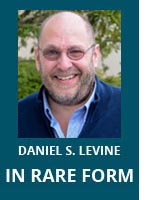
The rare disease community is used to giving to good causes, but some of the most important donations patients can make are not monetary, but biologic.
I’ve recently heard concerns voiced that patients don’t understand the importance of providing health information to researchers and the reluctancy they have to share their private health information.
One of the biggest problems around patient health information that is essential to advancing research is the need to both protect it, and also make it more widely available to ensure the greatest benefit can be derived from it.
The European rare disease organization Eurodis and the School of Social Sciences of Cardiff University recently published the findings from a multi-country survey of rare disease patients on data sharing and protection. More than 2,000 rare disease patients participated in the international survey, which was conducted through the Eurodis Rare Barometer program between March and May of 2018.
“Being in favor of sharing data and calling for more control are not contradictory; from these results we can see that patients have two parallel requirements,” said Sandra Courbier, Eurodis survey program senior manager and co-author of the paper. “They are open to systems that allow them to both share their data and equally retain control over who can access this data and how they will use it.”
Respondents expressed a strong willingness to provide their health information. Nearly all (97 percent) of the rare disease patients support data sharing to drive research and improve healthcare. Some 80 percent want full control (47 percent) or significant control (33 percent) over who, how, and why their information is being used.
The broader issue of concern here is what needs to be done to get rare disease patients to share their data and what other steps need be taken to advance research and accelerate the development of therapies in a way that fosters data sharing without it becoming a barrier to patient participation.
When survey participants were asked about why they would share their health data, people appear to be motivated by self-interest. The survey asked respondents to choose the top three reasons why they would share their health information from a list of answers. The top three reasons were that they wanted to learn more about their disease (69 percent), the possibility to discuss and ask questions directly to professionals involved in the project (66 percent), and the possibility to be informed on the results of the project (62 percent).
The authors offer a list of seven recommendations, which are broad and general. For instance, they call for appropriate legislation to “foster cultural, technological, and infrastructural changes to further develop international data sharing initiatives in health and research for rare diseases. They also call for robust standards to “ensure secure, ethical and responsible data sharing” and having safeguards around data protection.
But three of the last four points get to an essential issue about the need to promote the importance of data sharing and educate the public about it so they can make informed choices and understand why it matters.
I recently gave my DNA and health records to science. My healthcare provider, which happens to have an extensive research arm, asked if I would participate in its research bank and I consented. The biggest imposition was the time it took to answer an online survey of health questions.
I don’t control how the data is used and I don’t get the results. I’m not concerned about this institution using my data irresponsibly. I’m not concerned about them profiting from it. I did this because I trust how my data is going to be used and hope it will lead to better care for others.
We’re at a time where we have the opportunity to take large amounts of complex health and genetic data and interrogate and analyze them in ways that have previously not been possible. This will allow us to gain new insights into the connections between genetics, environment, diet, disease, and wellness. It should also accelerate the development of new therapies.
There are complex legislative, governance, and infrastructure issues around data sharing that need to be addressed. Patient organizations are paying great attention to this. (Global Genes Data DIY program is helping patient groups become sophisticated about these issues so they can act as responsible stewards of patient data). But at the most fundamental level, patient participation is essential.
If patients don’t understand why it matters that they offer their health information, don’t trust who is gaining access to it, or fear the folks who want their data will impede research by not sharing it, they will not want to provide it.

Stay Connected
Sign up for updates straight to your inbox.
